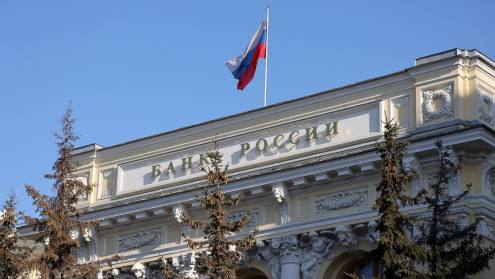The boom in retail banking is going to give way to mortgages as the next ‘killer product’ in Russia’s increasingly fast-moving retail banking sector.
Russia has already moved off square one and, with the Kremlin putting its weight behind mortgage promotion, the market is expected to grow exponentially. But mortgages only account for about 0.3% of GDP against consumer loans of about 4% of GDP.
“There is strong political will in the Putin circle to develop mortgages and have a working system in place by [the time of presidential elections in] 2008,” says Nataliya Orlova, chief economist at Alfa Bank. “Putin wants to promote mortgages as a panacea that will relieve the state of its social housing obligations, a hangover from the Soviet era.”
State encouragement
President Vladimir Putin has set an ambitious goal and wants a third of the Russian population in position to raise a mortgage by 2008. But market participants say that will be logistically impossible. The Kremlin is hoping to repeat the experience in the US, where mortgages acted as a social cement: citizens who own houses and have to pay mortgages tend to be more stable and conservative in their political views.
About 140 commercial banks have already rolled out mortgage programmes but Igor Kouzin, CEO of DeltaCredit, a market leader, says only five or six of them are serious players.
The popularity of consumer credits took off in 2001 but mortgages were only widely introduced about 18 months ago. DeltaCredit estimates that the total volume of outstanding mortgages is $1bn but it expects that to increase to between 3% and 4% of GDP by 2008 to about $40bn – still far behind the US’s 74% of GDP and Europe’s 62%.
Russians want to move
Mortgages are growing because most Russians want to move. A recent survey found that 70% of Russians own their own apartment following the mass giveaway of property in the early 1990s. However, 70% of Russians also want to improve their living conditions by buying a bigger flat.
The state-owned retail giant Sberbank is the biggest player in the sector after it extended about $500m worth of property loans – equivalent to half the market.
However, its credits are not true mortgages because the loan is not secured on the value of the property involved, but is backed by the signatures of two guarantors (who have to prove they have the means to take on repayments if the borrower defaults).
One critic of Sberbank’s approach quips: “What they are doing, in effect, is asking you to deposit your grandfather if you want to borrow money to buy a home.”
The state-owned Agency for Mortgage Crediting’s (AZhK) $130m worth of mortgages made it the biggest provider of ‘true’ mortgages between June 2004 and June 2005, followed by Austrian bank Raiffeisenbank with $70m and DeltaCredit’s $67m, which is backed by the US government.
Moscow has been the pioneer, given that 80% of Russia’s wealth is concentrated in the capital, but the richer regions have begun to issue mortgages at an even faster rate recently.
Regional growth
“Growth in the regional mortgage market revolves around people,” says Mr Kouzin. “For example, Ufa, the capital of oil-rich Bashkortostan, had more loans per capita than any other region last year. This was due to the active participation of our local correspondent bank and the support of the local governor.”
The demand is there but, if a third of the population is going to have a mortgage by 2008, new sources of refinancing must be found. Currently, only the AZhK and DeltaCredit are refinancing mortgage loans in roubles and dollars respectively.
Property prices in Moscow are about $1000 per square metre and a typical loan is $50,000 over 10 years at 10.5%, with the borrower putting up at least 25% of the cost of the apartment – enough to buy a modest property on the outskirts of Moscow.
Bigger mandate
The state set up AZhK in 1997 to promote mortgages and it can raise three to six-year money in roubles for about 10%, which it onlends at 14% over 26 years. However, having issued several bonds on the back of its state guarantee, it is also about to hit its government-imposed ceiling and is asking for a bigger mandate. The government is reluctant.
“This model is unsustainable over the long term,” says Mr Kouzin. “If the AZhK continues to lend with a state-backed guarantee then it will carry the can for the whole sector – and who can say what will be happening in Russia in 26 years?”
The market should come to the rescue at the end of this year, when banks can issue mortgage-backed bonds and securitisations for the first time after a law permitting them was passed in the current Duma session.











